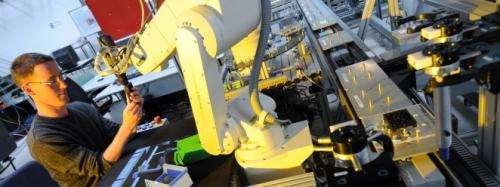Personalized factory workstations

Tomorrow's factory jobs will be completely different from those of today. Although they will continue to be organized around assembly stations, they will not work in rigid shifts, be subject to inflexible processes, or be restricted to a single workstation. According to Johannes Scholz and Johannes Labuttis, engineers who studied mechanical engineering at the Technical University of Munich, in 15 years most monotonous and strenuous activities will probably be a thing of the past. Scholz and Labuttis now work at Siemens Corporate Technology in Munich, where they focus on the role of humans in production processes. "In the future, workers will use their smartphones and computers to organize their shifts themselves," says Scholz. "When doing so, they will be able to take into account their personal chrono-biological attributes – for example, whether they're day people or night people. This will enable them to adapt their work assignments to their private needs and personal situations"
Flexible Production Lines
The idea here is to optimally align an employee's individual time management with a company's human resource requirements. This is important, as Scholz points out, because the factory of the future will be highly flexible and organized like a type of living Internet in which everything, and everyone, is networked. "Production lines and their individual assembly stations will be transformable, and it will be easy to retool them in line with the customer order in question," Labuttis explains. This will enable quick reactions to changes in demand. Workers will switch from one assembly station to another at a defined pace. They will be knowledgeable about all the steps involved – from production of individual workpieces to final assembly.
Plant managers will benefit from this because networking will allow them to deploy workers in the most efficient manner at all stations. Because everything will be networked, each workstation will "know" at all times which employee is scheduled to work at it next. It will then adjust its parameters accordingly within seconds. Tool placement will be personalized and optimized, and all height and angle-adjustable equipment will be adjusted to the worker's size, taking any employee limitations or disabilities into account. "The variations will be as individualized as the workers themselves and could include things such as standing aids, footrests, and even a completely different workstation layout," says Labuttis.
Robots will also be part of the picture, helping with things such as heavy lifting. Tomorrow's factories will be both productive and flexible, meaning that humans will provide flexibility while robots will ensure fast and efficient production. The average age of factory employees will also change. In particular, workers in today's industrialized countries will be significantly older due to the rapidly progressing demographic transformation that is already under way. By 2050, for example, the number of people over 65 around the world will triple from the current figure of 500 million. People will have to work longer if social security systems are to remain affordable. However, older workers will also be urgently needed because of their skills, knowledge and experience.
Provided by Siemens

















